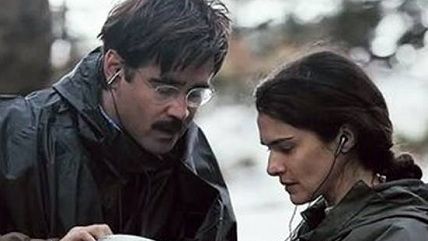Movie Review: The Lobster
Colin Farrell and Rachel Weisz in a deeply surreal love story.


Doughy shlub David (Colin Farrell) has just been dumped by his wife. Soon he finds himself on a bus with a bunch of other hapless singletons, being driven off to a big resort-like hotel on the banks of a wide bay. There he'll have 45 days to locate a new mate among a full house of other loveless losers. Should he fail to do this, he will be turned into an animal in the hotel's Transformation Room. It can be an animal of his choice, however. Pressed to select in advance, David picks a lobster. "I've always liked the sea," he says.
In his first English-language film, Greek director Yorgos Lanthimos extends the disturbing, poker-faced surrealism of his 2009 Dogtooth to examine the routine superficiality of human attraction and the possible impossibility of true love. Farrell, here sporting a modest paunch and a melancholy mustache, never cracks a smile; but despite occasional tentacles of horror creeping in, the picture is often darkly funny. This is not a movie like too many others. Or any, in fact.
Apart from David, the characters have no names. At a first-night meet-and-greet dinner (a soul-grindingly tatty affair), David makes the acquaintance of a young man with a limp (Ben Whishaw) and an older man (John C. Reilly) who has a lisp. David's defining characteristic, for purposes of hotel-enforced mate-seeking, is nearsightedness. He strikes out in his initial search for a companion, but Whishaw's limper finds a woman he likes. Unfortunately, her defining characteristic is nosebleeds, a condition with which he is unafflicted. He improvises an alarming fix, though, and soon he and nosebleed woman are a couple. For David, the clock keeps ticking.
A number of unattached hotel guests have escaped into a nearby forest over time, and the chilly hotel manager (Olivia Colman) regularly dispatches hunting parties—current guests armed with rifles that fire tranquilizer darts—to capture escapees and drag them back, presumably for a visit to the Transformation Room. These woodland fugitives, the Loners, are led by a grim-lipped woman (Léa Seydoux, of Blue Is the Warmest Color) who is dedicated to slapping down romance wherever it rears its sappy head. Even simple flirting is prohibited in her tribe, and violators of her anti-hookup rules are marked with a Red Kiss—razor-slashed lips. (There's also the threat of Red Intercourse—the specifics of which apparently needn't be detailed.)
After many bizarre experiences at the hotel (therapeutic crotch-dancing and, for masturbators, preventive hand-roasting), David falls in with the Loners. He's attracted to a sweet woman (Rachel Weisz) who is also nearsighted. She asks him to bring her dead rabbits. What's not to love?
The movie's tone is carefully balanced. As is usual in Lanthimos' films, the cinematography is rigorously unmannered, quietly highlighting the steady drip of plot oddities (in the forest we see previous hotel guests strolling by in the form of peacocks, flamingos and even camels) and intermittent spurts of weird, bloody violence. David and the other characters find nothing strange in any of this—they might have been tranq-darted themselves. But the picture's unforced eeriness gets under your skin, and its contemplation of the little lies and sellouts that sometimes pass for love is oddly moving. When true love finally is demonstrated, it provides the movie's biggest shock.


Show Comments (33)